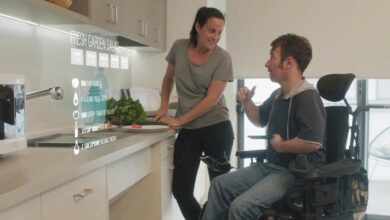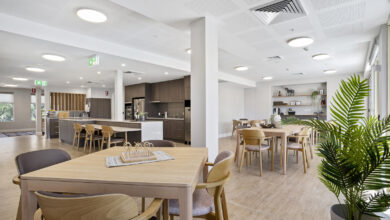Air ventilation crucial to protect residents over summer

Opening a window or using an air filtration device will be critical to help curb the spread of COVID-19 during the hotter summer months, experts have flagged.
As restrictions begin to ease in NSW, Victoria and the ACT, indoor areas with low ventilation will be the most at-risk for transmission of the delta strain.
Former dean of science at the University of Technology Sydney, Bruce Milthorpe, warns that aged care homes will be particularly vulnerable in hotter conditions as people avoid opening windows.
“If you're not exchanging the air in your room around about 10 times an hour, or a bit more, then that allows pollutants in the air to build up, which could be noxious smelly things, or it could be pathogens like the SARS-CoV-2 virus, which gives you COVID-19,” he said.
“That can then obviously affect people's health quite badly, and in aged care that can be quite a serious problem.”
Over 3,000 cases of coronavirus in Australia have been linked to residential aged care homes.
Poor ventilation could be a major factor driving high numbers of resident outbreaks, according to Milthorpe, who cited the first Victorian wave last year.
"Unlike in New South Wales at that time, Victoria had been advised to keep their COVID patients in the facilities rather than taking them to hospital," he said.
"Because the facilities were all shut up the number of viral particles in the air just increased to a level where it was likely that you would transmit."
Studies have shown that the delta variant can linger in the air for hours depending on how long an infected person remains indoors.
Most aged care homes are designed to be naturally ventilated with openable windows in each room, however, corridors, lifts, and staff meeting rooms still pose a high risk of infection, according to Milthorpe.
“There are a lot of factors that have to come together to make natural ventilation work well,” he said.
“If you don't have clean outside air or it's not comfortable enough for people to live with, or it's coming from the wrong direction or not blowing at all, then you need something else.
“You either need to force clean air from the outside, or you need to go to another strategy, which would be to use an air purifier with a HEPA filter.”
A recent UK study found that the use of a portable air filter in a COVID-19 hospital ward removed all traces of the airborne SARS-CoV-2 particles.
Providers should seek professional guidance to see which filter would be most effective based on the design of their facility and residents health needs, said Milthorpe.
Aged care facing an 'air quality crisis'
State governments have begun to recognise the role of air ventilation in protecting from COVID-19, with NSW health recently investing $100 million to place air purifiers inside public schools.
As seniors are also considered to be especially vulnerable to indoor pollution, there are growing calls to mandate air hygiene standards for the aged care sector.
“It's a very subjective set of standards that exist within the construction code, but just generally in terms of air, we don't have a standard in the local market,” said managing director of Pacific at Rentokil, Andrew Stone.
“We do have an air quality crisis at the moment, and the fact that we're not through this pandemic, there are many permutations as to how this could play out.”
Over the past year, Rentokil has run a series of indoor air summits to raise awareness towards the risks of poor air quality, including in aged care environments.
A recent survey conducted by the firm found that more than 1 in 3 Australians feel at-risk in aged care facilities, with over half concerned about visiting medical practices.
Investing in air purification technology is a key solution to living with the risk of COVID-19 in the future, said Stone.
“I think there's a perception, particularly in Australia, that we have blue skies and therefore our air is clear,” he said.
“But unfortunately when it comes to air quality, it's what you can't see that is dangerous."
Email: [email protected]




